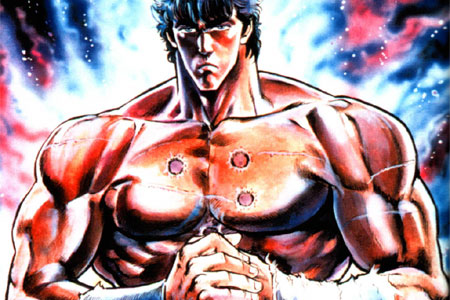Ask John: Thou Shall Not Kill?

Question:
I’m not sure if I’m the only one who has really noticed it now, but in American animation, guys like Batman and Superman are against killing the bad guy, no matter how cruel or evil he might be. Now going to Japanese animation, I just started watching Hokuto no Ken and we have Kenshiro just killing the bad guys left and right, going by the belief that anyone who is evil and has killed somebody doesn’t deserve to live. What’s the deal here?
Answer:
The examples of Batman and Superman refraining from causing mortal harm immediately arouse thoughts of the 1954 Comics Code Authority which established rules forbidding the depiction of glamorization or justification of crime in comic books. Batman and Superman couldn’t risk killing because by doing so they’d lose the seal of approval of the Comics Code Authority and merge into the dangerous and vile realm of underground and pornographic comics. (That is, of course, an exaggeration for hyperbolic effect.) However, the difference between American comic book heroes (not anti-heroes or “dark heroes”) that refuse to kill and Japanese manga and anime heroes who do commit murder without hesitation has much older roots. This fundmental difference between American and Japanese comics is a difference based in the different cultural history between Japan and America. It’s a difference that the subject, “Thou shalt not kill” directly refers to.
Prohibitions against unreasonable murder are a foundation of society. Every community that has a minimal degree of social functionality has some degree of respect for human life because being free from the fear of being killed at any moment is necessary to establish social trust. The degree to which this fundmental principle is culturally ingrained, though, differs between Japan and the West.
In ancient Rome, murder (as opposed to formal criminal justice) was sanctioned only within the gladiatorial arena. During the medieval era, a duel to the death determined evidence of divine favor. In the Renaissance through Victorian eras, duels were conducted with formal rules and under close scrutiny. The taking of life has never been permitted or justified in Western culture outside of strictly defined circumstances. However, the same is not the case in Japan. Cold-blooded murder has never been allowed in Japanese society, but consider the feudal Japanese concept of “kirisutogomen,” the right of a samurai to immediately execute anyone of lower class that insulted the samurai’s honor. The samurai had the right to be judge, jury, and executioner all at once, in a moment, as long as he explained and justified his actions afterwards.
Western civilization is largely founded upon the democratic ideals invented by the Roman Empire – ideals including a right to due course of law and subsequent punishment. Western civilization has also been deeply and profoundly influenced by The Bible, particularly in this case, the sixth commandment of “Thou shalt not kill.” For over two thousand years Western civilization has been restrained by adopted social rules and religious doctrine that proclaims murder is unethical and forbidden. However, Japan did not evolve under the influence of Christianity and its prohibitions against murder. Asian religions including Buddhism encourage a respect for all life, but Asian religions are typically guidelines rather than the strict moral code of Christianity.
I’m not at all suggesting that Japanese culture is less civilized or less moral than Western/Christian culture. By pointing out this difference I’m only trying to emphasize that there are centuries old, established cultural differences between Occidental and Japanese society and belief. American and Japanese cultures both recognize malicious, cold-blooded murder as unethical. American and Japanese cultures both recognize execution as a necessary form of punishment in certain circumstances. The difference lies in the “certain circumstances” under which American and Japanese cultures perceive execution as a potentially justifiable action.
While an American comic book “hero” that kills is an anti-hero or vigilante, a Japanese comic hero can be a killer and still accrue the respect, dignity, and moral character of a hero because Japanese society has historically had a more liberal idea of the excusable circumstances for execution than American society. Furthermore, while American society adamantly emphasizes a Christian ideal of forgiveness, rehabilitation, and second-chances, Japanese social philosophy places greater emphasis on accepting personal responsibility and efficient practicality.

